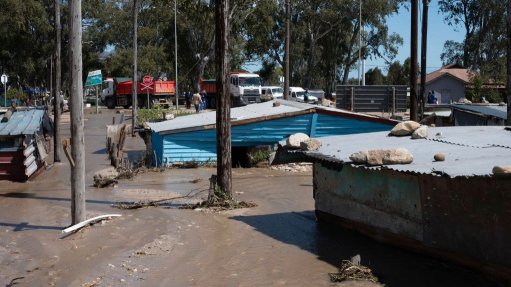
The risk of floods has increased in certain part of South Africa as a result of climate change
South Africa is now entering a new and more demanding phase of climate action, Presidential Climate Commission (PCC) deputy chairperson Valli Moosa asserts, stressing that the focus should not only be on setting targets but on delivering tangible results.
His statement follows the publication of the inaugural ‘South African State of Climate Action Report’, which finds that South Africa’s commitments to tackling climate change and facilitating a just transition are being hindered by incoherent policies, weak governance structures, and inconsistent actions by government and other stakeholders.
The report, which was adopted by the PCC at its meeting on June 7, provides a snapshot of the country’s progress in implementing a development pathway aligned with limiting warming to 1.5 °C, enhancing climate resilience, and improving the lives and livelihoods of South Africans.
It highlights a current mismatch between climate commitments and actions, highlighting in particular contradictory public policies and positions in the energy sector where government is wrestling with immediate trade-offs between energy security and growth and its climate, health and pollution commitments.
The report has been published at a time when Eskom has been given permission to delay the decommissioning of the Hendrina, Camden and Grootvlei power stations to 2030, with potential implications for whether South Africa will be able to meet its Nationally Determined Contribution target of reducing greenhouse-gas emissions to between 420-million and 350-million tons by 2030.
The report also identifies immediate actions for realising South Africa’s vision for a just transition and calls for investments in climate-resilient infrastructure, enhancing early warning systems, promoting sustainable land management, and supporting smallholder farmers to minimise the impacts of climate change on vulnerable communities and ecosystems.
“Strong government policies must drive a rapid, just response to climate change that recognises, protects, and realises human rights, with support from all stakeholders - businesses, civil society, labour unions, communities, and individuals”’ Moosa said.